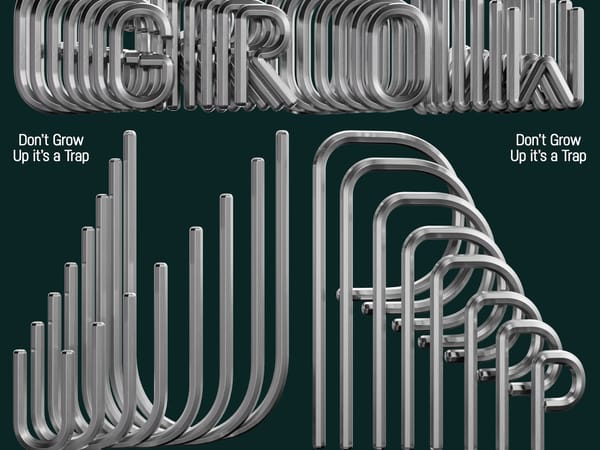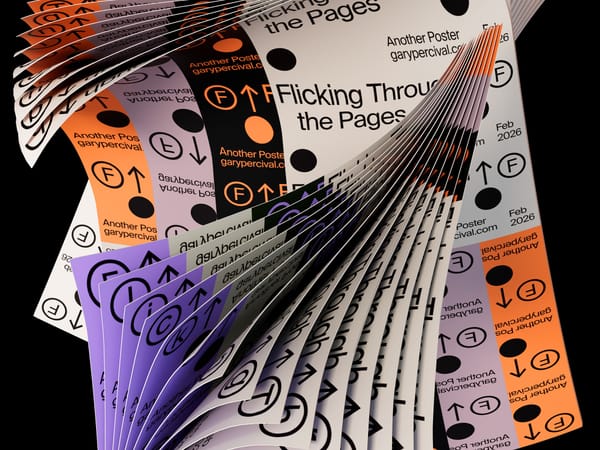Design your Life: How to Find Fulfilment in your Work
If you're like most people, you spend the majority of your time working.

If you're like most people, you spend the majority of your time working.
Whether you're a graphic designer, illustrator, student, or freelancer, finding fulfilment in your work is crucial to a happy and productive life.
There are a few things you can do to design your life in a way that allows you to find fulfilment in your work. Firstly, it's important to understand what fulfilment means to you and why it's important.
From there, you can start making changes in your life—whether they be at work or at home—to find a balance that allows you to achieve fulfilment in both areas.
Here are a few tips to get you started on designing your life for fulfilment in your work:
1. What is fulfilment, and why do we need it in our lives?
Fulfilment is defined as a feeling of satisfaction or happiness that results from completing a task or reaching a goal.
It is something that we all require in our lives in order to be happy and fulfilled. Work, family, hobbies, and so on are all examples of things that can provide us with fulfilment.
Work is a big part of many people's lives, so it's important that we find fulfilment in it. Work can provide a lot of satisfaction and happiness, but it can also cause a lot of stress and anxiety. Finding meaning in our work can help us live happier, more productive lives.
There are numerous avenues for finding fulfilment in our work. For some, it may mean pursuing a career in which they have a strong interest. For others, it may imply striking a balance between their professional and personal lives.
For others, it could simply mean enjoying the challenge of their work and the satisfaction of completing tasks.
Whatever your definition of fulfilment is, there are undoubtedly avenues for finding it in your work. It might just take some imagination and thinking outside the box. So, if you're dissatisfied with your current job, don't despair—there are definitely ways to change it.

2. How can we find fulfilment in our work—or create a job that offers it naturally?
Finding fulfilment in your work can be challenging if you're unsure of what that term means to you.
For some, it may be about having a job that is both challenging and constantly changing. For others, it may be about the ability to assist others and have a positive impact on the world. And for others, it may simply be about finding work that makes them happy.
Whatever your definition of fulfilment is, there are undoubtedly ways to find it at work. One of the most effective ways to find fulfilment in your work is to do something you're passionate about. If you are not passionate about your work, finding fulfilment in it will be extremely difficult.
Find a job that aligns with your interests and values and provides you with challenges and opportunities for growth. It may not be easy to find this type of work, but it is most certainly worthwhile.
Another way to find fulfilment at work is to maintain a healthy work/life balance. This is particularly critical if you have a family or other obligations outside of work.
If you're constantly working and never taking time for yourself, finding fulfilment in your work will be extremely difficult.
Ascertain that you are scheduling time for yourself each day, even if it is only a few minutes, and that you are not working more hours than you are capable of working.
Finally, keep in mind that fulfilment is a fluid concept that can shift over time. What satisfies you in your twenties may not satisfy you in your thirties or forties, and that's okay. As you develop and change, your definition of fulfilment is likely to shift as well.
Never be afraid to revisit your definition of fulfilment every few years and make the necessary adjustments to your life.
Finding fulfilment in your work is definitely possible, but it may take some effort to find the right job or strike the right work/life balance for you.
However, the effort is well worth it, as fulfilment can result in a more fulfilled and productive life.

3. What if we're not happy with our current work situation—is there anything we can do to change it?
Freelance graphic designers, web designers, and UX designers understand that their jobs can become monotonous.
Because of the nature of the job, you are frequently asked to produce a specific type of design over and over again.
Freelancers are also vulnerable to external forces, such as clients who demand more than they can afford or technological advances that render their skills obsolete. There are, however, things you can do to improve your current working situation and find fulfilment in your work.
First, examine your current situation critically and ask yourself why you're unhappy. Are you dissatisfied with your current job? Is it the clients with whom you're collaborating? Is it because of a lack of variety in your work?
Once you've identified the source of your dissatisfaction, you can begin to look for solutions.
If you're bored with your job, try changing things up a little. Take on some new clients or projects that will push you to think outside the box of your usual design.
Experiment with new styles and techniques. Most importantly, don't be afraid to put your own spin on things—your distinct point of view is what will set your work apart from the crowd.
If it's the clients you're working with who are the issue, look for new ones who are a better fit for you. Take advantage of all the resources available to you for finding new clients, such as networking, online portfolios, and word-of-mouth.
When you do land a new client, make sure to establish clear boundaries right away so you don't end up in the same situation you were in before.
Finally, if your work lacks the variety you seek, look for ways to incorporate more variety. Take on side projects or freelance work that is completely different from the kind of design you normally do. This will not only keep things interesting but will also broaden your skillset and make you a more well-rounded designer.
There are always ways to change your current work situation and find fulfilment in your work. So don't be afraid to experiment and try new things—you never know what you'll find.

4. What are some strategies for dealing with stress and anxiety in the workplace?
Many freelance graphic designers are constantly dealing with stress and anxiety, which is why it is critical to understand how to deal with these emotions.
Freelancing can be a great way for designers to experiment with their creativity and step outside of their comfort zone. Freelancers frequently rely on themselves for motivation and discipline, so they may have to get creative in order to stay calm and avoid burnout.
Here are some coping strategies for stress and anxiety:
- Take breaks throughout the day to clear your mind and recharge your batteries.
- Discover a hobby or activity that allows you to unwind and de-stress.
- Strive for a healthy work/life balance so that you are not overburdened by your workload.
- Maintain a high level of organisation and simplify your workload as much as possible.
- Tell someone about your feelings—a friend, family member, work colleague, etc.
Anxiety and stress are common among freelance graphic designers, but they do not have to control your life. By taking breaks, developing healthy coping mechanisms, and staying organised, you can manage your stress and anxiety in a way that works for you.

5. How can we create a more positive work environment for ourselves and others?
In order to have a more positive work environment, we need to be proactive in creating it.
This means setting boundaries and limits on how much stress we'll allow ourselves to take on, and not being afraid to speak up when something is bothering us. It's also important to be kind and supportive to our colleagues and to remember that everyone has bad days—including us.
If we can all work together to create a more positive and understanding environment, we'll all be much happier in the long run.

6. What are some small changes we can make in our daily lives to help find fulfilment in our work?
There are numerous small changes we can make to assist us in finding fulfilment in our work.
One is to savour the good times, no matter how insignificant they may be. Another thing to remember is to have realistic expectations—remember that not every day will be perfect, and that's okay.
Finally, it's critical to strike a balance between work and play—make time for yourself outside of work, and you'll be much happier and more productive when you're at work.

7. How do we know when it's time to move on from a job that's no longer fulfilling for us?
We may feel trapped in a job that no longer fulfils us, but that doesn't mean we have to stay there indefinitely.
Here are a few pointers on how to tell when it's time to leave a job:
- You have no longer been challenged: If you are no longer challenged in your current position, it may be time to look for a new one. If we are not constantly learning and growing, a job that was once stimulating and exciting can quickly become monotonous. If you're bored or uninterested in your job, it's probably time to look into other possibilities.
- You are not utilising your abilities: Our abilities are meant to be used and developed, not sit dormant. If you don't feel like you're using your skills and abilities to their full potential, it might be time to look for a job that will.
- You're dissatisfied: This one should be self-explanatory. If you're dissatisfied with your current position, it's time to start looking for a new one. Life is too short to be dissatisfied with one's job!
If any of these apply to you, it may be time to start looking for a new job. Remember that it's critical to find work that both challenges and excites you—work that you can see yourself doing for many years. Otherwise, you'll end up in the same situation again and again.
8. How do we balance the responsibilities of work and home life to achieve fulfilment in both areas?
Setting aside time each day for both work and home life is one way to ensure that you can find fulfilment in both.
Making time for your family and friends, as well as your job, is essential.
Finding this balance can be difficult, but it is important to try. If you don't feel like you have enough time at home, you might want to change your work schedule. There are numerous options available, so don't be afraid to investigate them.
It is much easier to find fulfilment in both your work and your personal life when you enjoy what you do. If you are unsure of what you want to do, there are numerous resources available to assist you.
Once you've decided what you want to do, you can start looking for a job that will allow you to have a fulfilling work life as well as a fulfilling home life.
Whatever steps you take, remember that finding a balance that works for you is essential. There is no one-size-fits-all solution to finding fulfilment at work and at home. What works for one person might not work for the next.
The key is to find a system that allows you to be happy and fulfilled in both aspects of your life. With a little effort, you can find a balance that works for you and allows you to be fulfilled at work and at home.
9. Final thoughts on how to design a life that offers fulfilment and happiness
Freelancing is an excellent way to design a life that offers fulfilment and happiness.
Freelancers can work on their own terms, are not bound by the hours of an office job, and have more time for personal projects.
Freelance designers often enjoy the freedom to be creative in ways they don't when working as part of a team. And, as we've seen, there are many different ways to freelance—from design sprints to setting up your own studio.
There's no one right way to design a fulfilling and happy life. However, by understanding what fulfilment means to you and taking steps to achieve it, you can create a life that offers both.
So, what are you waiting for? Get out there and start designing your life today!



